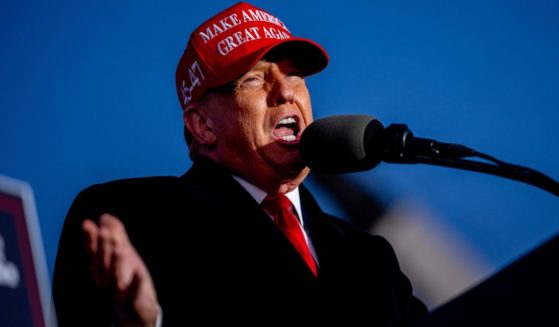Americans Having 2nd Thoughts on Leftist EV Utopia: 'They Get Hot When They're Stored, Not Just When They're Charging'
The Biden administration’s pipedream of an electric vehicle-dominated future for the United States continues to crumble with each passing day.
Among the mountain of problems associated with EVs are spontaneous battery fires, charging headaches, exorbitant car prices and an outsized environmental impact in their manufacturing process.
H. Sterling Burnett of the Heartland Institute, who is the managing editor of Environment & Climate News and director of the Arthur B. Robinson Center on Climate and Environmental Policy, told CBN News on Tuesday that one of the major issues is that the lithium-ion batteries used to power electric cars are a safety hazard — even when the cars are not in use — because they generate a lot of heat and can spontaneously combust.
“The safety implications are the fact these batteries get hot,” Burnett said. “They get hot when they’re stored, not just when they’re charging – just when they’re sitting there stored. They combust.”
During Hurricane Ian, some EV owners in Florida were forced to get rid of their cars after the lithium-ion batteries burst into flames because of saltwater damage.
“Junkyards filled with water-damaged cars strategically displayed gas-powered cars squeezed together and electric cars spaced far apart — in case one spontaneously caught fire,” CBN News reported.
“Firefighters say it takes about 1,000 gallons to put out a normal car fire and ten times that for an electric vehicle.”
The hazard was so alarming that Florida State Fire Marshal Jimmy Patronis wrote a letter to Tesla CEO Elon Musk asking him to address the fire risk.
Musk has not responded, according to CBN News.
However, the National Highway Traffic Safety Administration did reply to Patronis, saying “lithium-ion battery fires have been observed both rapidly igniting and igniting several weeks after battery damage occurred.”
Here was the feds key takeaways: 1.) “[W]e can confirm your experience in North Collier with reignition is not an isolated event…” (2/5)
— Jimmy Patronis (@JimmyPatronis) October 14, 2022
3.) “Test results specific to saltwater submersion show that salt bridges can form within the battery pack and provide a path for short circuit and self-heating. This can lead to fire ignition.” (4/5)
— Jimmy Patronis (@JimmyPatronis) October 14, 2022
Another issue is the relative dearth of EV recharging stations across the country. Right now, most of the 53,000 charging stations in the United States are in big cities.
This charging nightmare has been well documented, with numerous anecdotes of drivers spending hours trying to find a charging station, only to wait a long time to fully charge their vehicle.
Those who are able to find a station often encounter long lines.
Still want to buy an EV? Here’s a Tesla charging line in California:#EV #Charging #Tesla #EVLife #ElectricVehicles #Cars #Autos #ElonMusk pic.twitter.com/ThrewJNvFi
— laurenfix (@laurenfix) July 2, 2022
Ironically, another major drawback of electric vehicles is how environmentally costly it is to produce them.
While left-wing activists claim EVs are better for the environment because they supposedly generate zero carbon emissions, their environmental impact is immense.
Physicist Mark Mills, a senior fellow at the Manhattan Institute, told CBN News the supply chain that markets the manufacturing of lithium-ion batteries is “utterly dominated by China.”
As a reminder, China is the world’s biggest carbon polluter that’s notorious for its lax environmental policies.
“Like any vehicle – they have to mine materials to make the car,” Mills said. “You have to mine a lot more materials, metals, to make an electric vehicle than you do a conventional vehicle. By about 1,000 percent on average.”
He explained that miners must use heavy machines that burn diesel oil to dig up 500,000 pounds of earth to make a single, 1,000-pound EV battery.
To manufacture each EV battery, you must process
25,000 pounds of brine for the lithium
30,000 pounds of ore for the cobalt
5,000 pounds of ore for the nickel, 25,000 pounds of ore for copper
Diging up 500,000 pounds of the earth’s crustFor just – one – battery. https://t.co/1y6Eeu1DWd pic.twitter.com/qLm5DHIIXS
— Brian Roemmele (@BrianRoemmele) March 14, 2022
“All those emissions from all that energy usage to dig those materials up cause carbon dioxide to be emitted somewhere else,” Mills told CBN News.
“So when the electric vehicle is delivered to your driveway, it’s already arriving with massive emissions of carbon dioxide that you eventually pay off,” he said. “It’s kind of like an inverse mortgage by driving that instead of an internal combustion engine.”
When you add the high prices of EVs to the environmental damage caused by their manufacturing process to the many inconveniences of recharging them, it’s no wonder that some Americans are hesitant to jump on this bandwagon.
Warning: African Children Died Mining Cobalt For Your EV’s Battery https://t.co/uAM7IAODHN
— Climate Dispatch (@ccdeditor) November 14, 2022
🧵Perspective on Electric Vehicles.
Batteries do not make electricity; they store electricity produced elsewhere from coal, natural gas powered plants, or diesel fuelled generators. So, to say an EV is a zero emission vehicle is incorrect.
— Wicked Maverick (@WickedMaverick) March 23, 2022
President Joe Biden has championed the goal of crushing the oil industry in order to advance “green energy” programs because they supposedly combat climate change.
However, transitioning 332 million Americans from fossil fuels to so-called green energy will be expensive and inconvenient — and it isn’t even guaranteed to be better for the environment.
If you like electric cars, that’s great. But the federal government should not destroy the energy industry and erode U.S. energy independence in order to compel Americans to switch to EVs.
Truth and Accuracy
We are committed to truth and accuracy in all of our journalism. Read our editorial standards.












